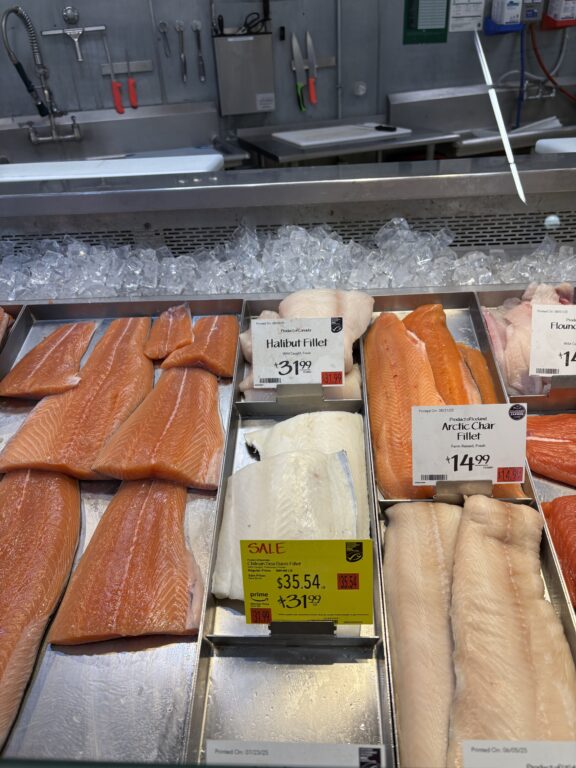Consumer Diary: Eggs, Groceries

Audio By Carbonatix

Eggs, toast, and home fries. Photo credit: Ronni Newton
Consumer columnist and West Hartford resident Harlan Levy has more than 20 years of experience writing stories about everyday experiences that anyone could encounter.

Harlan Levy. Courtesy photo
By Harlan Levy
Every Sunday for more than a decade we have a special breakfast at home – eggs, toast, coffee, bananas, raspberries, strawberries, blueberries, and avocado. This past Sunday we had fried eggs. We also had fried quail eggs for the first time. I was hesitant, but they were very tasty.
Occasionally my wife makes egg salad. Also very tasty. But in consuming all these eggs, I was concerned about all the cholesterol I was consuming.
Do any of you readers limit yourself because of cholesterol fear?
I decided to do some research and found a very recent study that gave me the facts about eggs and cholesterol:
The report published in The American Journal of Clinical Nutrition provides scientific evidence that you don’t need to stress about eggs’ cholesterol content.
The researchers’ randomized controlled study followed 61 adults on one of three diets to follow for five weeks. One group’s diet – eating two eggs a day – was high in cholesterol, low in saturated fat. A second group ate an egg-free diet, low in cholesterol, and high in saturated fat. The third group had a diet of one egg per week, high in cholesterol, and high in saturated fat.
The researchers discovered that people who ate two eggs a day lowered their LDL (“bad”) cholesterol compared to the third group. They also found that it was the saturated fats found in foods like bacon and sausage that are usually eaten with eggs that actually raise LDL cholesterol levels, not the cholesterol in eggs themselves.
Compared with consuming a high-saturated fat diet with only one egg a week, consuming two eggs daily as part of a low-saturated fat diet lowers LDL concentrations, which may reduce cardiovascular disease risk, the study concluded.
“Cholesterol is an essential nutrient that has many roles, including functioning as a precursor to hormones and contributing to the integrity of cellular membranes,” wrote researcher Sonya Angelone, a nutritionist and registered dietitian. “This is why your liver produces cholesterol.”
Also, the report said, research has not provided strong evidence that dietary cholesterol, especially from eggs, increases blood levels of cholesterol or increases the risk for heart disease.
Research also indicates that diets too high in saturated fats can contribute towards developing cellular inflammation and insulin resistance, a metabolic condition in which your body’s cells do not respond to insulin as efficiently as they should, leading to possible health problems including type 2 diabetes and difficulty losing or maintaining a healthy weight.
Saturated fats also tend to be found in highly processed foods, which are also known to raise LDL cholesterol, the researchers said.

Eggs provide outstanding dietary elements including healthy organic choline, contrary to negative falsehoods.
We eat eggs every Sunday, this time with quail eggs for the first time. Photo credit: Harlan Levy
Eggs’ health benefits:
- Containing about 6.5 grams of protein each, eggs are not only considered a complete protein, containing all nine essential amino acids, but they are also regarded as having high bioavailability – the extent to which the nutrients in food are absorbed and utilized by the body – due to their ease of digestibility and absorption, the report said.
- The yolk and egg white contain essential vitamins and minerals like vitamins A,D,E, and K, B12, iron, and selenium. The yolks are a good source of iron, containing carotenoids lutein and zeaxanthin, which promote eye health.
- Eggs are also a rich source of choline, a nutrient that supports brain health and isn’t found in large amounts in other foods.
Tariffs
I am amazed that since Trump’s tariffs went into effect on Aug. 1 – a 50% tariff on Brazil and India, 30% tariffs on Mexico and China, and 15% on the European Union – the prices I’ve surveyed on tomatoes from Canada and avocados from Mexico haven’t soared.
But make no mistake, the effects are coming. Fresh vegetables and fresh fruit will take the hit first, as sellers cannot stockpile these items, also, bananas and mangos, which are not produced in the U.S. at all, will be hit the hardest.
Then there’s seafood prices rising, because the U.S. imports the majority of its seafood, and many major suppliers, including Chile, India, Indonesia, and Vietnam, face tariffs of 10% to 46%.
Wine from the EU is vulnerable, too, also olive oil since Spain, Italy, and Greece, key sources, are part of the EU. And coffee will take a kick in the pants, since we import 80% of our roasted coffee primarily from Latin America, and major suppliers Brazil and Colombia face 10% tariffs.

Trump’s tariffs will hit foreign seafood prices hard. Whole Foods offers a variety soon to rise in price after he levied his beloved tariffs Aug. 1. Photo credit: Harlan Levy
So here are this week’s prices on imported seafood and bananas at Big Y, Whole Foods, and Trader Joe’s:
- Big Y: Bananas: Organic: 79 cents/lb. Non-organic: 69 cents/lb. Canadian salmon: $12.49/lb.
- Whole Foods: Bananas: Organic: 69 cents/lb. Non-organic: 69 cents/lb. Norwegian salmon: $19.99/lb.
- Trader Joe’s: Bananas: Organic: 29 cents each. Non-organic: 23 cents each. Norwegian salmon: $9.99/lb.
Best choice by far: Trader Joe’s.
I’ll see if the tariffs have any effect on affected grocery items next week.
NOTE: If you have a consumer problem, contact me at [email protected] (“Consumer” in subject line), and, with the power of the press, maybe I can help.
Like what you see here? Click here to subscribe to We-Ha’s newsletter so you’ll always be in the know about what’s happening in West Hartford! Click the blue button below to become a supporter of We-Ha.com and our efforts to continue producing quality journalism.



